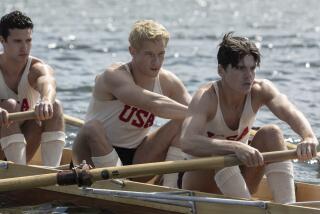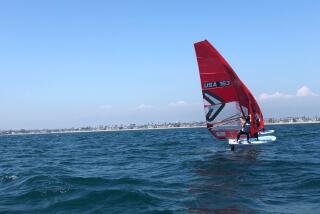Yes, It All Began With a Boat Race
- Share via
If you had to guess, what would you say is the oldest intercollegiate sports competition in the country? In the world?
Football? Forget football. It didn’t come along till 1869.
Baseball? Boxing? Hardly.
The first athletic competition recorded between institutions of higher learning occurred in England in 1829. It was a boat race between Oxford and Cambridge. Rowing is the oldest intercollegiate sport anywhere in the world.
The first intercollegiate competition in the new world was also rowing--Harvard-Yale in 1852.
Rowing was once the romantic sport of college life. Frank Merriwell rowed. So did Gregory Peck. Paul Gallico. Averell Harriman.
Long before the campus hero was the All-American halfback, he was the stroke oar on the crew. Long before the Four Horsemen or the Seven Blocks of Granite, the Harvard Eight with cox was considered the epitome of athletic excellence.
The whole notion of collegiate competition began with crew. It opened the way to the Rose Bowl, Final Four, Big Ten, Ivy League, We’re No. 1, Betty Coed, Boola Boola, Alma Mater Dear--the whole hoopla of my-school-can-beat-your-school.
It all started on the Thames River, not the playing fields of Eton.
The Harvard-Yale boat race on the American Thames at New London was a social event that made the Super Bowl look like a square dance. Boat trains were laid on to track the progress. You were a social nobody unless you had a seat on it and a hamper of wine and caviar trucked aboard by the family chauffeur.
Well before football games attracted that sort of attendances, 80,000 people lined the Hudson River to watch crew races. Mobs fought for position along the Schuylkill in Philadelphia, where great artists’ favorite subjects were oarsmen under the bridges.
It’s not only a pretty sport, it’s a grueling one. Races initially were contested in long boats pulled off the decks of a man o’ war of the royal navy. But these were refined into the construction of strict racing machines, sleek, keel-less “shells,” so paper-thin and delicate that they have the consistency of egg shells. A rower dare not stand up in one.
The sliding seat was introduced in the 1970s. Before that, oarsmen had to sit in puddles of heavy grease to avoid getting blisters.
Races used to be four miles long, but Americans were too impatient for this. Too often, races were processions, tests of endurance rather than style and ingenuity. Races today are 2,000 meters, the Olympic distance.
Despite the foreshortening, rowers today come out of the competition in the dazed, oxygen-indebted condition of men crawling out of plane wrecks. Superb physical and mental condition are demanded.
It’s a strength sport. Even though that weight can be crucial, oarsmen with sufficient strength and power tend to be an average of 6 feet 5 inches tall and over 200 pounds.
The eight-oared shell race has become the glamour event of the sport of rowing, although sculling was popularized in this country by Philadelphia’s Kelly family. In crew, the oarsman propels a single oar. In sculls, he propels two oars.
The oar may be older than the wheel. Caesar invaded England with oared Roman galleys and, of course, American oarsmen helped win the Revolution by getting Washington across the Delaware to the battle of Trenton.
What brings this to mind at this time are two pieces of rowing information. The first is that next April 12, the UCLA eight will meet a crew from the cradle of rowing, Oxford University, and one from the University of California, on the waters of Ballona Creek here.
That’s the good news. The bad news is, UCLA may thereafter discontinue crew as a university activity. The leaning of the academic and athletic administrations is in that direction, the crew coach, Jim Sims, acknowledges. The sport is not economically viable.
The Merriwell brothers would get the vapors. Egad! No crew? Why, the very concept of Old Blue derives from the ribbons on the chemises of the varsity oarsmen, their blades flashing in the sun as they streak 40 strokes to the minute to victory over the hated Crimson.
Not have crew? Fie on you! Better not to have Fiesta Bowls, NCAA regionals. How can you not have crew and keep such grubby little Johnny-come-latelies as football, basketball, volleyball and baseball? Do away with the Bruin eight and keep such nouveau sports as volleyball and basketball?
Shouldn’t an American boy know how to row a boat? What do we do, meet the Oxfords with an outboard?
Do away with crew? What’s next? The band? Card tricks? Cheerleaders? Homecoming queens? Heismans? Fight songs? They all derive from crew.
It’s hard to believe there are such ingrates in academia, such indifference to tradition. I don’t believe these Philistines have both oars in the water.
More to Read
Go beyond the scoreboard
Get the latest on L.A.'s teams in the daily Sports Report newsletter.
You may occasionally receive promotional content from the Los Angeles Times.










